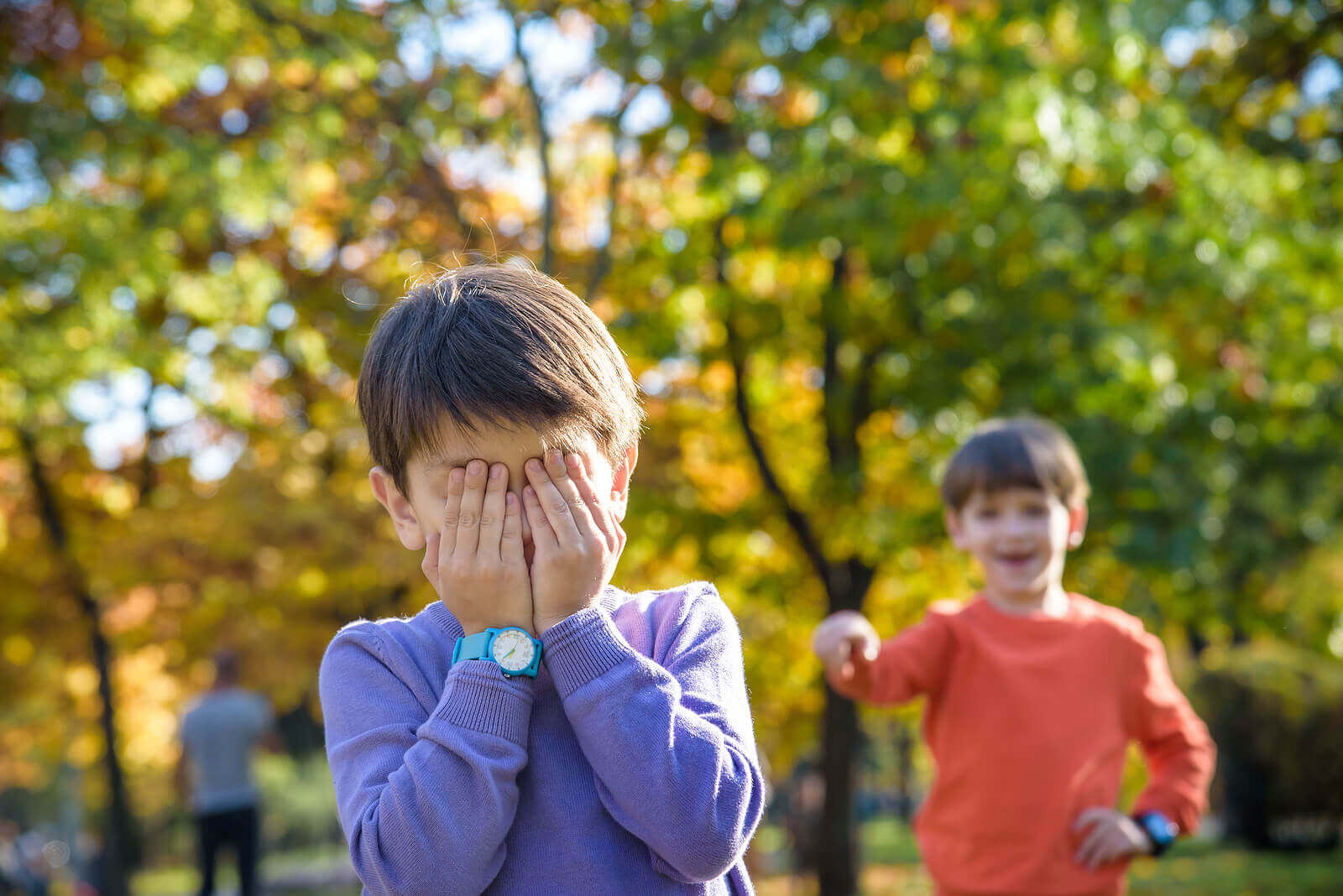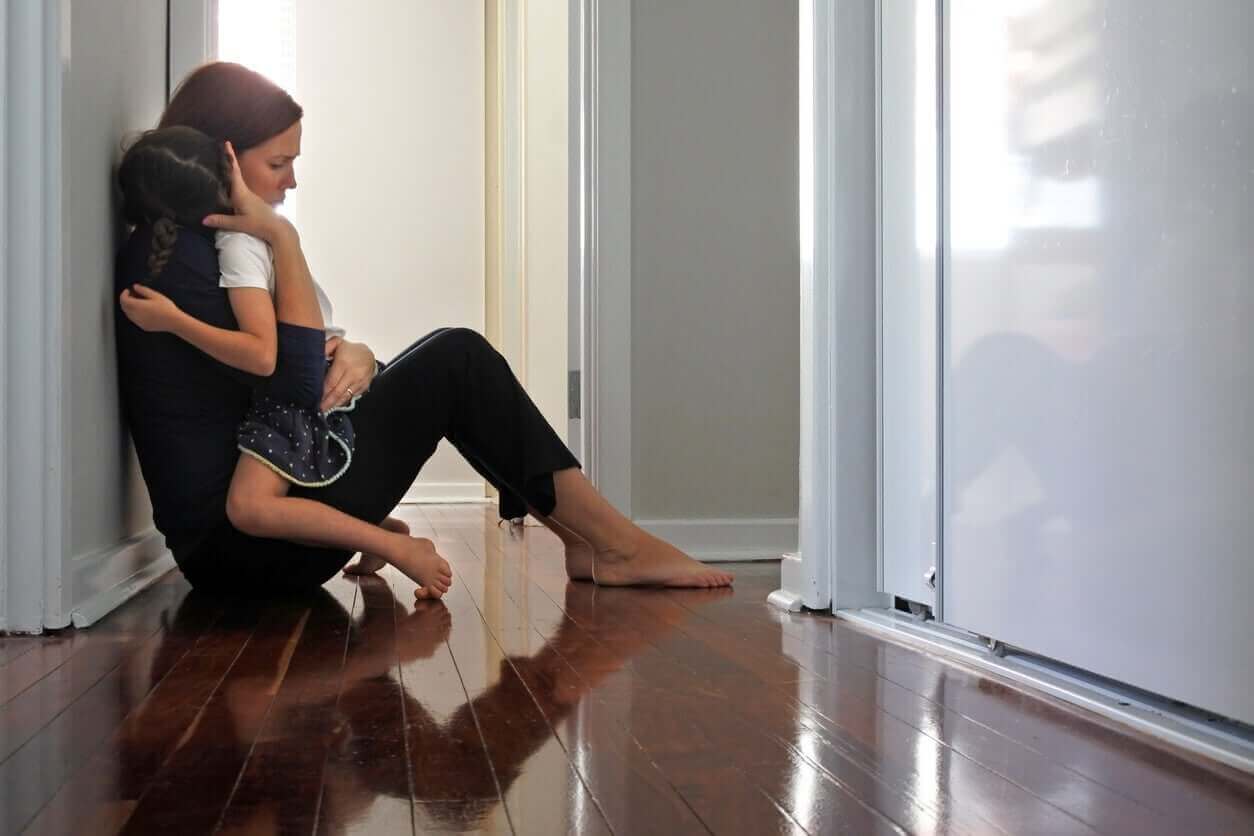What to Do When Children Don't Want to Defend Themselves

Bullying occurs more and more frequently in schools and institutes. Many times, parents feel overwhelmed by this situation because it’s something that’s difficult to face. In fact, seeing your children suffer from such bullying is very traumatic for everyone. So, to avoid jeopardizing children’s self-esteem and safety, it’s important to take action. But what happens when children don’t want to defend themselves?
All humans are different, and for this reason, there are children who are attacked by others but don’t want to defend themselves or find doing so difficult. It’s the parents’ job to teach them to do it, but without using violence.
In childhood, there can be many situations that are capable of harming children, such as teasing, taking toys away from them, hitting, or not wanting to play with them. These scenarios are inevitable, so we need to teach kids to face them and solve them in a healthy way. And without dropping to the level of those who are attacking them or allowing themselves to be hurt. We’ll tell you more in the article to follow.
Why some children don’t want to defend themselves
Sometimes, children don’t want to defend themselves for various reasons, either because they don’t know, because they don’t feel capable of dealing with their aggressors, or because they don’t have enough tools to do so.
It’s best to teach children skills to communicate calmly and peacefully. We mustn’t teach them to respond aggressively, as violence only provokes more violence.
It’s essential to prepare children to deal with these situations and to end them as soon as possible.
So, if you discover that your child is being bullied at school, show your support and try to help them without losing patience. It’s very normal to feel angry with this situation, but it’s important to keep your cool and make it clear to little ones that they’re not alone in this.

How to teach them to defend themselves properly
As we’ve mentioned, the main thing is to teach your children to defend themselves without resorting to violence. If we say, “If they push you, you push them back”, we give them the understanding that, under certain circumstances, aggressive behavior is justified. But this isn’t the case.
Here are some tips to educate your child in this regard.
Improve their self-esteem
Always try to make children’s self-esteem flourish so that they value themselves and feel sure of themselves. Your support and positive reinforcement in the face of success will be good drivers to develop it.
Educate to improve assertiveness
Teaching children to communicate assertively is essential. This will allow them to assert themselves and stand up to whoever attacks them through dialogue.
So that they practice at home, in case they’re afraid or don’t know how to do it, put him in the situation and help them practice.
Another important thing to teach children is to say “no” so that they’re able to set limits when they don’t want to do something or aren’t interested. Also, if they dislike something, they have to know how to convey this with sincerity, respect, and assertiveness.
Promote the evasion of offenses
Most cases of harassment or bullying begin with an offensive word or some other offense. This is usually bullies’ way of provoking and hurting kids they perceive to be weaker.
For this reason, children must be taught to evade these offenses effectively, and we must give them resources for the rest of their lives.
These tools can be the following:
- Respond to the offense as if it were unimportant: If they’re not interested in what they hear, with your head held high, they can go somewhere else.
- Ignore offensive comments: Explain to your little one that leaving the site of the assault isn’t a sign of cowardice, but rather a tool to deal with such teasing.
Instill emotional control
One of the strategies that bullies carry out is to annoy the victims until they lose their patience. Even until they get angry or cry. This makes them feel stronger and more powerful.
The problem is that if the child gives in and is vulnerable, they become the perfect victim and may be frequently bothered. It’s clear that controlling emotions in a situation like this is complicated, but it takes practice to master it.
Therefore, it’s very important to teach children self-control strategies in these situations. For example, breathing to relax while walking away, counting to 10, not making an annoyed or angry face, among others.
Reinforce the support of the child’s environment
It’s very difficult for children to cope with this situation when they’re alone, as they feel unprotected, weak, and insecure. But, things change if they have the support of other peers or their group of friends.
So, if your child suffers from this type of bullying, you should encourage them to tell their trusted peers in order to get their support.
It’s important to make them see that asking for help doesn’t mean that they’re a coward. Rather, teach them that it shows their great maturity in solving the problem on their own. Also, if they have friends, they’ll feel stronger to deal with the conflict before talking to their teachers.
Listen to them and don’t blame them
Another thing we have to keep in mind is to pay attention and listen to your children when they tell you something. If they share with you everyday school situations and there’s a conflict that hasn’t been resolved properly, you must show them the correct way to do it. It’s important to provide the strategies and the ways to do it without resorting to violence.

Conclusion regarding what to do when children don’t want to defend themselves
Now you know that when children don’t want to defend themselves, it’s possible to encourage them to do so in a healthy way and without violence.
Dialogue, assertiveness, social skills, and other resources that we teach them will be essential for the rest of their lives.
Bullying occurs more and more frequently in schools and institutes. Many times, parents feel overwhelmed by this situation because it’s something that’s difficult to face. In fact, seeing your children suffer from such bullying is very traumatic for everyone. So, to avoid jeopardizing children’s self-esteem and safety, it’s important to take action. But what happens when children don’t want to defend themselves?
All humans are different, and for this reason, there are children who are attacked by others but don’t want to defend themselves or find doing so difficult. It’s the parents’ job to teach them to do it, but without using violence.
In childhood, there can be many situations that are capable of harming children, such as teasing, taking toys away from them, hitting, or not wanting to play with them. These scenarios are inevitable, so we need to teach kids to face them and solve them in a healthy way. And without dropping to the level of those who are attacking them or allowing themselves to be hurt. We’ll tell you more in the article to follow.
Why some children don’t want to defend themselves
Sometimes, children don’t want to defend themselves for various reasons, either because they don’t know, because they don’t feel capable of dealing with their aggressors, or because they don’t have enough tools to do so.
It’s best to teach children skills to communicate calmly and peacefully. We mustn’t teach them to respond aggressively, as violence only provokes more violence.
It’s essential to prepare children to deal with these situations and to end them as soon as possible.
So, if you discover that your child is being bullied at school, show your support and try to help them without losing patience. It’s very normal to feel angry with this situation, but it’s important to keep your cool and make it clear to little ones that they’re not alone in this.

How to teach them to defend themselves properly
As we’ve mentioned, the main thing is to teach your children to defend themselves without resorting to violence. If we say, “If they push you, you push them back”, we give them the understanding that, under certain circumstances, aggressive behavior is justified. But this isn’t the case.
Here are some tips to educate your child in this regard.
Improve their self-esteem
Always try to make children’s self-esteem flourish so that they value themselves and feel sure of themselves. Your support and positive reinforcement in the face of success will be good drivers to develop it.
Educate to improve assertiveness
Teaching children to communicate assertively is essential. This will allow them to assert themselves and stand up to whoever attacks them through dialogue.
So that they practice at home, in case they’re afraid or don’t know how to do it, put him in the situation and help them practice.
Another important thing to teach children is to say “no” so that they’re able to set limits when they don’t want to do something or aren’t interested. Also, if they dislike something, they have to know how to convey this with sincerity, respect, and assertiveness.
Promote the evasion of offenses
Most cases of harassment or bullying begin with an offensive word or some other offense. This is usually bullies’ way of provoking and hurting kids they perceive to be weaker.
For this reason, children must be taught to evade these offenses effectively, and we must give them resources for the rest of their lives.
These tools can be the following:
- Respond to the offense as if it were unimportant: If they’re not interested in what they hear, with your head held high, they can go somewhere else.
- Ignore offensive comments: Explain to your little one that leaving the site of the assault isn’t a sign of cowardice, but rather a tool to deal with such teasing.
Instill emotional control
One of the strategies that bullies carry out is to annoy the victims until they lose their patience. Even until they get angry or cry. This makes them feel stronger and more powerful.
The problem is that if the child gives in and is vulnerable, they become the perfect victim and may be frequently bothered. It’s clear that controlling emotions in a situation like this is complicated, but it takes practice to master it.
Therefore, it’s very important to teach children self-control strategies in these situations. For example, breathing to relax while walking away, counting to 10, not making an annoyed or angry face, among others.
Reinforce the support of the child’s environment
It’s very difficult for children to cope with this situation when they’re alone, as they feel unprotected, weak, and insecure. But, things change if they have the support of other peers or their group of friends.
So, if your child suffers from this type of bullying, you should encourage them to tell their trusted peers in order to get their support.
It’s important to make them see that asking for help doesn’t mean that they’re a coward. Rather, teach them that it shows their great maturity in solving the problem on their own. Also, if they have friends, they’ll feel stronger to deal with the conflict before talking to their teachers.
Listen to them and don’t blame them
Another thing we have to keep in mind is to pay attention and listen to your children when they tell you something. If they share with you everyday school situations and there’s a conflict that hasn’t been resolved properly, you must show them the correct way to do it. It’s important to provide the strategies and the ways to do it without resorting to violence.

Conclusion regarding what to do when children don’t want to defend themselves
Now you know that when children don’t want to defend themselves, it’s possible to encourage them to do so in a healthy way and without violence.
Dialogue, assertiveness, social skills, and other resources that we teach them will be essential for the rest of their lives.
All cited sources were thoroughly reviewed by our team to ensure their quality, reliability, currency, and validity. The bibliography of this article was considered reliable and of academic or scientific accuracy.
- Armero Pedreira, P., Bernardino Cuesta, B., & Bonet de Luna, C. (2011). Acoso escolar. Pediatría Atención Primaria, 13(52), 661-670. Disponible en: https://scielo.isciii.es/scielo.php?script=sci_arttext&%20pid=S1139-76322011000600016&lng=es&nrm=iso
- Garaigordobil, M., & Oñederra, J. A. (2010). Inteligencia emocional en las víctimas de acoso escolar y en los agresores. European journal of education and psychology, 3(2), 243-256. Disponible en: https://www.redalyc.org/pdf/1293/129315468008.pdf
- Suckling, A. (2006). Herramientas contra el acoso escolar: un enfoque integral. Ediciones Morata.
This text is provided for informational purposes only and does not replace consultation with a professional. If in doubt, consult your specialist.








